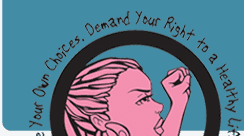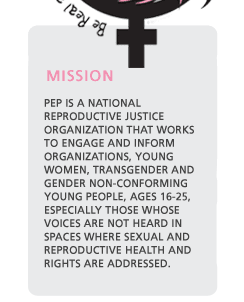What is reproductive justice without the ability to fully express, control and affirm ones sexuality? Incomplete, at best.
The common ground for the LGBT liberation and the reproductive justice movements has a long and rich history even though we have often been strategically divided. Reproductive freedom was a lynchpin of the modern feminist movement of the 1960s and 1970s. New contraceptives and reproductive technologies liberated women from unwanted pregnancy as a consequence of heterosexual sex. When women could take control of their reproductive destinies, they also had more control over their own sexual pleasure. The freedom and legitimacy of sexual activity without reproduction as an outcome is as fundamental to the liberation of LGBT people as it is to heterosexual women and their male partners.
Legal advocates are perhaps the most aware of the intersections between our movements, for they can clearly see the connections in the work they do fighting for LGBT liberation and/or reproductive rights every day. The decisions in Griswold v. Connecticut (1965) and Eisenstadt v. Baird (1972) held first that criminal prohibition of contraceptive devices for married couples, and later for any individual, violated a fundamental right of privacy. These cases helped lay the groundwork for an argument that the individual has a right to decide how and when to engage in consensual sexual activity. Furthermore, the 2003 Supreme Court decision, Lawrence v. Texas, which decriminalized same-sex relations between consenting adults, relied upon two of the most influential reproductive rights cases-Roe v. WadePlanned Parenthood v. Casey (1992)- to emphasize that attacks on either of our struggles can no longer be separated. (1973) and
Furthermore, an important aspect of the obstacles that face both of these movements concerns the right-wing political agenda that targets both reproductive freedom and LGBT rights. Proponents virulently pursue this agenda, seeking to control sexuality, gender conformity, reproductive choice and the legal definitions of family. They have been successful in influencing the make-up of the Supreme Court, supporting individuals committed to rolling back the hard-won gains of both our movements.
Policies sponsored by right-wing extremists attacking reproductive justice and LGBT liberation have detrimental effects on all of us. For example, the "Marriage Imperative" for low-income families not only works against women who are trying to escape abusive situations, but also actively discriminates against LGBT people who are not allowed to marry. Sex education programs that promote "abstinence until marriage" serve to deny young people information about safer sex and prevention of pregnancy and HIV/AIDS. They also further marginalize and alienate LGBT youth by defining their sexuality as pathological. Health insurance policies often refuse to cover contraception, emergency contraception, and abortion. Likewise, these policies often have restrictions on or lack of coverage for infertility services, especially services needed to create LGBT families. These are just a few of the many policy intersections that affect both our movements.
What can you do?
- Join our Causes in Common coalition www.causesincommon.org and be part of a growing national network of organizations committed to seeing connections in our movements and working toward shared goals.
- Make the connections between movements in your work. You can do this in your speech, in your literature, in joint forums, and in your outreach.
- Build campaigns around shared goals, such as comprehensive sex education. Be an ally even when your primary issue is not at the forefront.
- Service providers can integrate reproductive health, LGBT competent services, transgender health care, and HIV/AIDS services.
| 





